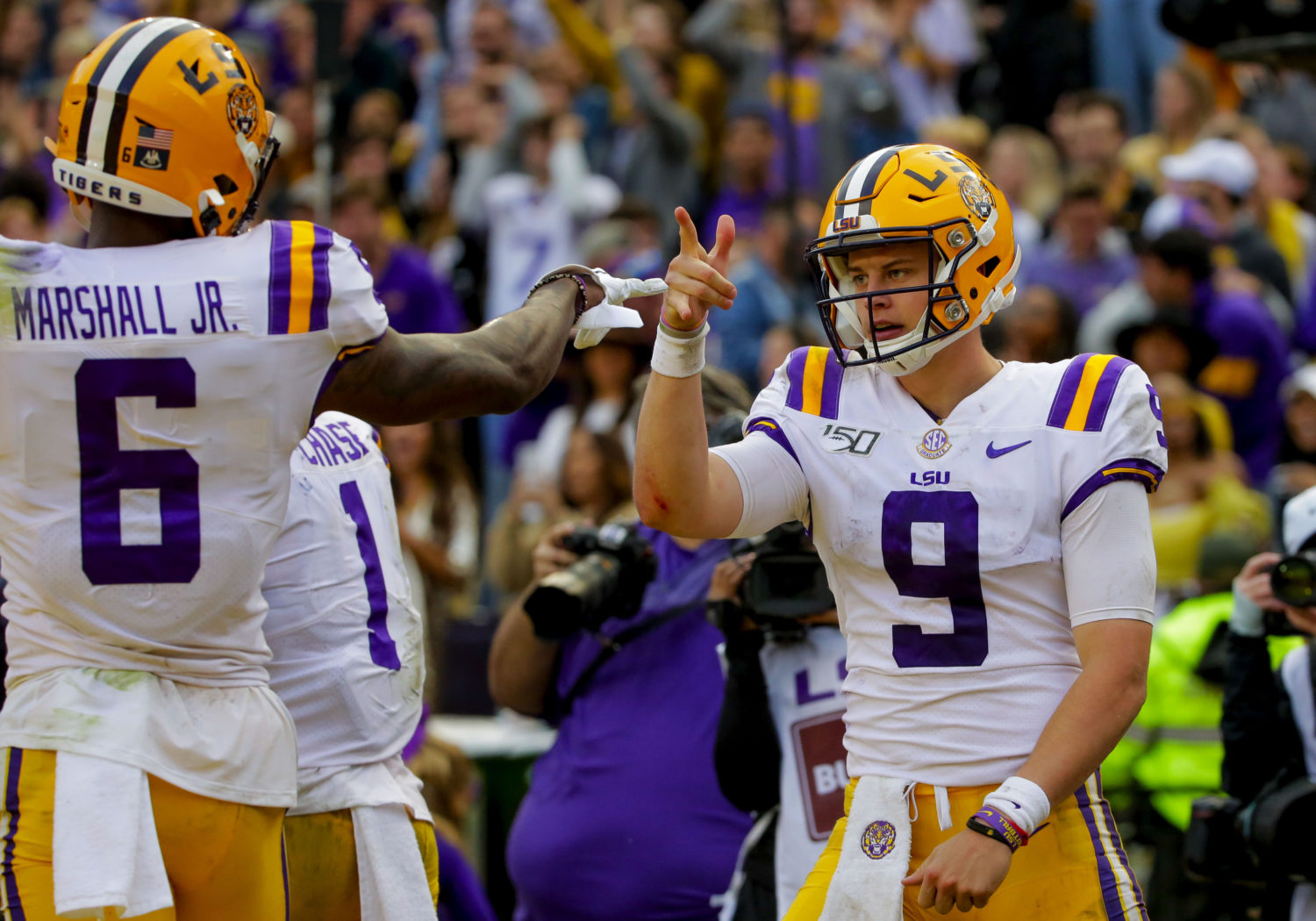
Some historic context on when (not “if”) Joe Burrow wins the Heisman Trophy
Joe Burrow is going to be standing among the all-time greats on Saturday night.
There’s zero suspense to that. The LSU quarterback will be the next Heisman Trophy winner, and anyone arguing he shouldn’t is just doing so to be a contrarian.
(Sorry, “Chase Young is the most dominant player in college football” crowd. It’s an incredibly strong season, but 11 games of that doesn’t trump the 13 games we’ve seen from Burrow.)
What is there to talk about, you ask? Everything has already been said and written about Burrow. Ohio Joe was the guy who didn’t have a job 20 months ago, and LSU welcomed him with open arms … yada, yada, yada. We’ve heard it all. Still, though, we know Tom Rinaldi is going to find a way to make us cry on Saturday night.
Burrow’s 2019 numbers obviously are more impressive than any other quarterback, despite what a certain Dan Orlovsky tried to argue about Trevor Lawrence. Even Young himself admitted that Burrow is better than Ohio State teammate Justin Fields, who figures to get the second-most Heisman votes among quarterbacks. Comparing Burrow to 2019 players seems like a waste of time at this point.
Instead of doing that, let’s get historic, but not too historic. In my opinion, comparing Burrow’s year to quarterbacks who played in 1965 doesn’t make sense. The game was drastically different. It might even be a bit unfair to compare Burrow’s season to someone from 15 years ago.
Three SEC quarterbacks won the Heisman in the 21st century. Burrow will make it 4. His season already compares favorably to Tim Tebow’s 2007, Cam Newton’s 2010 and Johnny Manziel’s 2012. That much we know. In fact, if you look at their pre-Heisman numbers on a per-game basis — Tebow and Manziel got only 12 games compared to 13 for Burrow and Newton — one could argue that Burrow is having the best season (so far).
[table “” not found /]Pretty crazy, isn’t it?
One could argue that Burrow’s season is already better than Tebow’s and Manziel’s, neither of whom played for a national championship. And while Burrow certainly has more weapons and help around him than Newton, it’s no debate who had the better statistical season in every non-rushing category.
Newton, of course, went on to complete the ultimate hat trick. That is, conference title, Heisman Trophy and undefeated national champion. Burrow is trying to do that, which would be the first time anyone did that in the Playoff era.
We all remember Newton as a slam-dunk Heisman winner, and he was. Andrew Luck finished second with 78 first-place votes compared to Newton’s 729. Newton ended with a possible 81.55 percent of the overall points, which was higher than Tebow and Manziel, who earned 70.52 and 72.88 percent, respectively. In fact, Newton’s mark was the highest of any SEC Heisman winner ever.
Burrow is set up to earn a higher percentage than all 3 of those quarterbacks. The question is if he can set the all-time mark. Technically, Reggie Bush set it in 2005 when he earned 91.77 percent of the possible Heisman points. Among non-vacated Heismans, that title belongs to Troy Smith in 2006, when he earned 91.63 percent of the overall points.
(I’m not going to waste my time comparing Burrow’s numbers to his because it’s not a fair fight. How Smith won in such a landslide that year is still beyond me.)
Can Burrow exceed that? I wouldn’t rule it out. What seems more likely, though, is that the “Young is the most dominant player in college football” crowd tries to make a statement and take some of Burrow’s first-place votes away. That’s ultimately why I think the All-American defensive end will finish second in the voting.
My guess is that the target range for Burrow is somewhere between Baker Mayfield at 86 percent and Bush. That would still be an unbelievable accomplishment. Shoot, if Burrow bests Mayfield’s mark, it’ll likely be the second best of the decade. Catching Marcus Mariota at 90.92 percent might be difficult.
But just for fun, why don’t I run Burrow’s numbers next to Mariota’s:
[table “” not found /]It’s easy to forget just how good Mariota’s season was because like the other Heisman-winning quarterbacks in the Playoff era, it didn’t end with a national championship victory.
If Burrow becomes the first quarterback to do that, there will be few seasons in college football history that compare. Of course, that’s a major “if.”
We remember Deshaun Watson for beating Alabama and winning Clemson a national championship, and not for the fact that he threw 17 interceptions and cost himself the Heisman because of it. We remember Cardale Jones for taking the college football world by storm as a third-string quarterback and winning Ohio State the national championship, and not for the fact that his redshirt freshman teammate grossly outperformed him for nearly the entire year.
The hay is already in the barn on Burrow’s Heisman. If he does win by a historic landslide, his argument as having one of the all-time great single seasons will only strengthen.
And if he does go on to lead LSU to a national title, well, a new statue in Baton Rouge awaits.
Connor O'Gara is the senior national columnist for Saturday Down South. He's a member of the Football Writers Association of America. After spending his entire life living in B1G country, he moved to the South in 2015.







